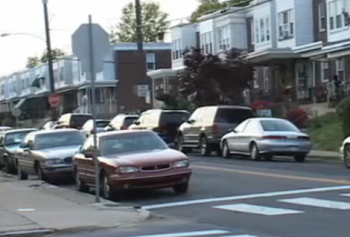Neighborhoods battle absentee landlords (part 2 of 2)

In part 2 of a two-part series, we explore Tacony’s and Lawncrest’s fights against absentee landlords in their neighborhoods.
Camille Capobianco, 37, grew up in Tacony. She said her neighborhood was once good, clean and friendly. Now, she said, residents are fighting the evils of what has become a nightmare epidemic in most neighborhoods throughout Northeast Philadelphia.
Absentee landlords have stricken most of the communities and have left local residents to fear, avoid and fight their new tenants.
“Most [absentee landlords] are from out of state, but there are some local slumlords,” Capobianco, a mother of three daughters, said.
Absentee landlords purchase cheap properties and then rent out the homes for investment. They tend to live far away from their properties, as well. Capobianco said many people have complained that these landlords do not have proper licenses most of the time, do not have property managers and do not care whom they rent their properties to as long as their houses are filled and rent checks arrive every month.
“There are so many senior citizens who are afraid to come out of their houses because the rental property next door has prostitutes and/or blunt parties,” Capobianco said.
The loss of her job and a divorce forced Capobianco to move to New Jersey unexpectedly, but her passion for the cause is still there.
“It’s not even my block,” Capobianco said. “I loved my neighborhood. I know what a happy childhood I had there. I don’t want to see it become a ghetto. I wasn’t involved, but I do hold the people involved accountable. So, I got involved with politics. I got involved with the Republican Party and then the civic group.”
Capobianco, determined to keep her neighborhood as she remembers it from her childhood, took the initiative when she saw a “For Rent” sign go up on a property.
“In my cell phone, I have addresses and phone numbers of people with ‘For Rent’ signs in the neighborhood,” Capobianco said. “I would call the landowners ahead of time, telling them what the community expects of them before they rent the places out.”
Sometimes, she said, she would have to play hardball.
“If we don’t get that cooperation, we will go up against you,” she said she has told some new landlords.
Most landlords that Capobianco called before they rented out their properties were understanding, but Capobianco said one particular landlord thought he could “bully his way around the situation.”
“One guy on Knorr Street told me, ‘I own 350 houses. You can’t touch me,’” Capobianco said. “‘Then me and my committee of little elderly ladies will be on your front yard protesting,’ I told him. He said, ‘You still can’t touch me.’
“‘Well, then the little elderly ladies will go downtown and complain that they are afraid to go outside of their houses, and you will lose your license,’” Capobianco added. “He told me, ‘You’re pretty smart.’ I told him to take his capital and use it for good and not evil. He then offered me a job. I said, ‘No thanks. I don’t work for the devil.”’
These types of situations are spreading throughout the Northeast.
Kathy Wersinger, 55, a resident of Lawncrest and the administrative assistant to 9th District Councilwoman Marian Tasco, said she feels that absentee landlords have gone too far.
“I think it’s awful,” Wersinger said. “It’s a disgrace that these people are in it only for a check. They don’t care who they have in there as long as they get their rental check each month.”
“About 40 percent to 45 percent of the neighbors are renters in Lawncrest, and I call 911 on a frequent basis,” Wersinger added. “Yes, I am affected. My quality of life is affected.”
Landlords and are supposed to have business licenses and property managers if they do not live nearby. Most of the time, however, when people need to go to landlords for emergencies or to serve complaints, they are faced with P.O. Boxes instead of legitimate addresses.
“New Yorkers can come down and buy property because it is so much cheaper,” Capobianco said. “They were bringing in busloads of investors from New York on bus tours. I believe the Northeast was specifically targeted.”
After seeing the first “For Rent” sign, Capobianco started her own cause.
“My petition said that they need to have a verifiable address, so they could be served for due process on that address,” Capobianco said. “I got about 4,000 signatures. I also got a lot of hate mail from people because I’m Republican. The best thing for me was when I actually helped individual people.”
Wersinger said Tasco is currently trying to publish legislation. Tasco announced at the Lawncrest Community Association meeting last Tuesday that she is posting legislation to make sure that property owners have, at the very least, legitimate, verifiable addresses attached to their rental properties.
Capobianco said too many politicians have promised to help solve this problem, to no avail. She said she only hopes someone will come through on his or her promise.
Until then, she will continue to keep watch on the Northeast neighborhoods, even if it is from afar.
Maria Konidaris is a Temple University journalism student working with Philadelphia Neighborhoods, a class devoted to covering under-reported areas of Philadelphia.
WHYY is your source for fact-based, in-depth journalism and information. As a nonprofit organization, we rely on financial support from readers like you. Please give today.



